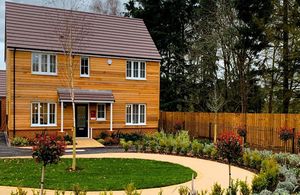Lea Castle Village becomes first Homes England site to gain Build with Nature accreditation
One of Homes England’s key commitments in creating a successful community at Lea Castle Village is to create a high-quality scheme which responds to the unique opportunities presented by the existing green infrastructure and setting.
Our main objective is to make sure the homes the country needs are built where they’re most needed, but we’re also committed to creating sustainable and well-designed places that protect and enhance the natural environment.
The former Lea Castle Hospital site near Kidderminster, Worcestershire, is surrounded by woodland which is home to a diverse range of plant and animal species.
In order to create a community that works in harmony with this unique setting, we worked with partners at Worcestershire Green Infrastructure Partnership (WGIP) and Borough and County ecologists in our role as site owner to develop a framework for green infrastructure at Lea Castle, proposing measures in the outline planning application which would safeguard and enrich the existing environment.
Green infrastructure is defined by Natural England as ‘…a network of multi-functional green space, both new and existing, both rural and urban, which supports the natural and ecological processes and is integral to the health and quality of life of sustainable communities.’
With outline planning approved, we stipulated the developer must be an early adopter of our emerging approach to place making, including seeking Building with Nature accreditation.
Building with Nature (BwN) is a voluntary scheme that sets out standards for high quality green infrastructure at each stage of the development process, from planning and design to long-term management and maintenance. The BwN standards enable nature friendly features to be integrated throughout a development and cover areas including biodiversity, water management and green infrastructure.
Since the start on site to create 600 new homes in October 2020, developer Vistry Partnerships have worked with us, local councils, the WGIP and a number of specialist consultants to ensure the new Lea Castle Village development meets BwN standards.
The site is home to a number of European Protected Species of bat, including lesser horseshoe, brown long-eared and pipistrelle bats. As some of the redundant buildings due for redevelopment were roosts for the animals, replacement roosts were needed elsewhere on site. In addition to creating new homes for the bats, a redundant substation on site was converted.
Doors were removed and blocked up, and hanging tiles added to external walls to create crevices for the bats. A specially designed tile access was made for the roof to enable the bats to get into the building. As more residents move onto the site, information boards will be provided to explain the use and importance of the bat roosts.
Vistry and their consultants TEP also created a lighting strategy including dark corridors and specialist bat lighting to maintain the commuting and foraging corridors between bat roosts and surrounding off-site foraging habitats. Additional planting and screening are also being introduced to further mitigate the impacts of the development on the bats.
As a dormouse nest had previously been found on the site, all existing tree groups and woodland at the site’s edges were retained, to maintain existing commuting routes for the species. Additional landscape planting on the sides of the site’s main spine road will provide an arboreal commuting route across the road and create further foraging and nesting resources for the mice.
In June 2021 Vistry were awarded a Building with Nature Design Award for their development at Lea Castle, demonstrating that the scheme’s design had gone beyond statutory requirements to deliver a high standard of green infrastructure for people and wildlife.
It’s the first of our sites to be granted the award – but the work doesn’t stop there. The Lea Castle site has allocation for a further 800 homes, as well as employment land, a new primary school, sports pitch, orchards and allotments.
With the support of the Worcestershire Green Infrastructure Partnership, we’re looking at how we can improve green infrastructure on the site by ensuring woodland is protected and opportunities for wider biodiversity and recreational links are created. Access to woodland will be opened up with footpaths and a significant area of acid grassland habitat, a priority habitat in Worcestershire, is proposed, as well as sustainable drainage features.
Around 40 per cent of the wider Lea Castle site will consist of green infrastructure with the aim of delivering 10 per cent biodiversity net gain – and securing further Build with Nature accreditation.
To make sure more of our sites are designed with Building with Nature’s principles at their heart, Leanne Tipple (Senior Technical Manager – Environment) and Lisa Palframan (Senior Technical Manager – Environment) have qualified as Build with Nature assessors. This will enable them to provide our project managers with the guidance they need to make space for nature, creating places and communities that support wildlife, water and wellbeing.

